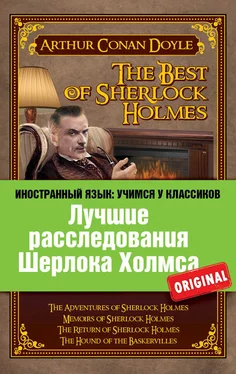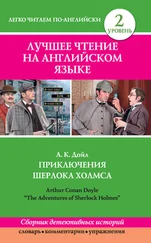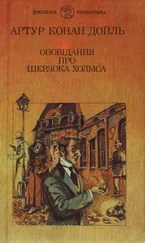“Your narrative is most interesting,” said Sherlock Holmes. “I have already heard of your meeting with Mrs. Barclay, and your mutual recognition. You then, as I understand, followed her home and saw through the window an altercation between her husband and her, in which she doubtless cast his conduct to you in his teeth. Your own feelings overcame you, and you ran across the lawn and broke in upon them.”
“I did, sir, and at the sight of me he looked as I have never seen a man look before, and over he went with his head on the fender. But he was dead before he fell. I read death on his face as plain as I can read that text over the fire. The bare sight of me was like a bullet through his guilty heart.”
“And then?”
“Then Nancy fainted, and I caught up the key of the door from her hand, intending to unlock it and get help. But as I was doing it it seemed to me better to leave it alone and get away, for the thing might look black against me, and any way my secret would be out if I were taken. In my haste I thrust the key into my pocket, and dropped my stick while I was chasing Teddy, who had run up the curtain. When I got him into his box, from which he had slipped, I was off as fast as I could run.”
“Who’s Teddy?” asked Holmes.
The man leaned over and pulled up the front of a kind of hutch in the corner. In an instant out there slipped a beautiful reddish-brown creature, thin and lithe, with the legs of a stoat, a long, thin nose, and a pair of the finest red eyes that ever I saw in an animal’s head.
“It’s a mongoose,” I cried.
“Well, some call them that, and some call them ichneumon,” said the man. “Snake-catcher is what I call them, and Teddy is amazing quick on cobras. I have one here without the fangs, and Teddy catches it every night to please the folk in the canteen.
“Any other point, sir?”
“Well, we may have to apply to you again if Mrs. Barclay should prove to be in serious trouble.”
“In that case, of course, I’d come forward.”
“But if not, there is no object in raking up this scandal against a dead man, foully as he has acted. You have at least the satisfaction of knowing that for thirty years of his life his conscience bitterly reproached him for this wicked deed. Ah, there goes Major Murphy on the other side of the street. Good-by, Wood. I want to learn if anything has happened since yesterday.”
We were in time to overtake the major before he reached the corner.
“Ah, Holmes,” he said: “I suppose you have heard that all this fuss has come to nothing?”
“What then?”
“The inquest is just over. The medical evidence showed conclusively that death was due to apoplexy. You see it was quite a simple case after all.”
“Oh, remarkably superficial,” said Holmes, smiling. “Come, Watson, I don’t think we shall be wanted in Aldershot any more.”
“There’s one thing,” said I, as we walked down to the station. “If the husband’s name was James, and the other was Henry, what was this talk about David?”
“That one word, my dear Watson, should have told me the whole story had I been the ideal reasoner which you are so fond of depicting. It was evidently a term of reproach.”
“Of reproach?”
“Yes; David strayed a little occasionally, you know, and on one occasion in the same direction as Sergeant James Barclay. You remember the small affair of Uriah and Bathsheba [166]? My biblical knowledge is a trifle rusty, I fear, but you will find the story in the first or second of Samuel.”
The Adventure of The Resident Patient
Glancing over the somewhat incoherent series of Memoirs with which I have endeavoured to illustrate a few of the mental peculiarities of my friend Mr. Sherlock Holmes, I have been struck by the difficulty which I have experienced in picking out examples which shall in every way answer my purpose. For in those cases in which Holmes has performed some tour de force [167]of analytical reasoning, and has demonstrated the value of his peculiar methods of investigation, the facts themselves have often been so slight or so commonplace that I could not feel justified in laying them before the public. On the other hand, it has frequently happened that he has been concerned in some research where the facts have been of the most remarkable and dramatic character, but where the share which he has himself taken in determining their causes has been less pronounced than I, as his biographer, could wish. The small matter which I have chronicled under the heading of “A Study in Scarlet,” and that other later one connected with the loss of the Gloria Scott , may serve as examples of this Scylla and Charybdis [168]which are forever threatening the historian. It may be that in the business of which I am now about to write the part which my friend played is not sufficiently accentuated; and yet the whole train of circumstances is so remarkable that I cannot bring myself to omit it entirely from this series.
I cannot be sure of the exact date, for some of my memoranda upon the matter have been mislaid, but it must have been towards the end of the first year during which Holmes and I shared chambers in Baker Street. It was boisterous October weather, and we had both remained indoors all day, I because I feared with my shaken health to face the keen autumn wind, while he was deep in some of those abstruse chemical investigations which absorbed him utterly as long as he was engaged upon them. Towards evening, however, the breaking of a test-tube brought his research to a premature ending, and he sprang up from his chair with an exclamation of impatience and a clouded brow.
“A day’s work ruined, Watson,” said he, striding across to the window. “Ha! The stars are out and the wind has fallen. What do you say to a ramble [169]through London?”
I was weary of our little sitting-room and gladly acquiesced. For three hours we strolled about together, watching the ever-changing kaleidoscope of life as it ebbs and flows through Fleet Street and the Strand. His characteristic talk, with its keen observance of detail and subtle power of inference, held me amused and enthralled. It was ten o’clock before we reached Baker Street again. A brougham was waiting at our door.
“Hum! A doctor’s – general practitioner [170], I perceive,” said Holmes. “Not been long in practice, but has had a good deal to do. Come to consult us, I fancy! Lucky we came back!”
I was sufficiently conversant with Holmes’s methods to be able to follow his reasoning, and to see that the nature and state of the various medical instruments in the wicker basket which hung in the lamplight inside the brougham had given him the data for his swift deduction. The light in our window above showed that this late visit was indeed intended for us. With some curiosity as to what could have sent a brother medico to us at such an hour, I followed Holmes into our sanctum [171].
A pale, taper-faced man with sandy whiskers rose up from a chair by the fire as we entered. His age may not have been more than three or four and thirty, but his haggard expression and unhealthy hue told of a life which has sapped his strength and robbed him of his youth. His manner was nervous and shy, like that of a sensitive gentleman, and the thin white hand which he laid on the mantelpiece as he rose was that of an artist rather than of a surgeon. His dress was quiet and sombre – a black frock-coat, dark trousers, and a touch of colour about his necktie.
“Good-evening, doctor,” said Holmes, cheerily. “I am glad to see that you have only been waiting a very few minutes.”
“You spoke to my coachman, then?”
“No, it was the candle on the side-table that told me. Pray resume your seat and let me know how I can serve you.”
Читать дальше
Конец ознакомительного отрывка
Купить книгу











